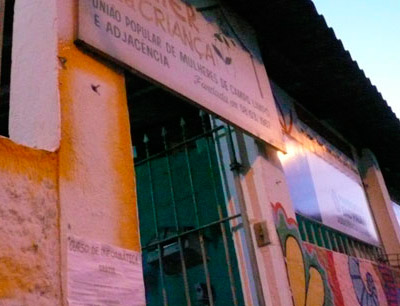Last week, the team from the 30th Bienal Reading Room, consisting of members of the Arquivo Bienal and Educativo Bienal, visited Sarau Vila Fundão in the region of the Campo Limpo and Capão Redondo, neighbourhoods situated in the Southeast of São Paulo. The visit began at the Casa da Mulher e da Criança (House of Women and Children). The team received a warm reception from Rafael, one of the most active agents in the community, who is involved in various projects, spaces, cultural and educational activities in the region, through an organization called Agência Popular Solano Trindade.

Casa da Mulher e da Criança, Jardim Maria Sampaio – Campo Limpo, São Paulo
Rafael told us about the União Popular de Mulheres de Campo Limpo e Adjacência (The Popular Union of the Women of Campo Limpo and Surroundings) and its long history which began in the middle of the last century with the arrival of Northeastern migrants who had to work in civil contruction in São Paulo. They established themselves in the region of Campo Limpo, which at the time was totally undeveloped. It was the women among these migrants who, having come up with ways of improving things in the neighbourhood, founded the União at the beginning of the 1960s.
While a literacy class for adults was taking place in one of the rooms in the house and coffee was being prepared in another room at the back of the house, Rafael told us about the Banco Comunitário União Sampaio (Sampaio Union Community Bank) which is also located in the house and which was set up for the purpose of democratizing financial and banking services for the community, with the aim of promoting local development. Among the services offered by the bank are capital deeds, and a variety of types of credit.

Rafael in the agency of the Banco Comunitário União Sampaio
With the support of the bank, the Agência Solano Trindade created a cultural currency they termed “Solano”, lending credence to and strengthening cultural projects and production spaces by means of a network of people who collaborate and exchange services, products and skills.

Examples of Community Currency taken from the Brazilian Network of Community Banks (there are more than eighty throughout Brazil).
From the Women’s Union Rafael took us to the new headquarters of the Agência nearby – a collaborative space in a three-floor building with a glass stairway, workshops, offices, rooftop areas and a good auditorium. We met members of Ateliê Popularte who share the space with other artists and cultural collectives. Together, these organizations and collectives carry out inumerous activities.
Finally we arrived at Sarau Vila Fundão, which takes place every Thursday. It’s a fun night and in the “Mano Brown Area” the atmosphere was friendly and open. Lots of children, everyone knows each other. In the end we are talking of a community, in the sense that everyone there is sharing something they have in common and that they do together.
A bar with a projector, a PA, some beer, pastel and a patio from which it was easy to see where the name fundão (real deep) came from. People started to arrive bit by bit and all of a sudden all the chairs were taken and the street started to fill up….


The lights go out, the children focus, and the projection begins: A Pedreira de São Diogo, by Leon Hirszman, one of the episodes of a seminal film of new cinema 5xFavela, from 1962. Tonight’s episode shows the resistence put up by a community who lived at the top of a quarry and who ran the risk of falling into the quarry as a result of the explosions. “Ah, this is old, but it’s new too” someone comments. The film is watched in silence by the audience and is followed by a debate which brings the story up to date, merging it into the reality of looming World Cups and Olympics and the process of rising property prices and social hygiene issues.

The Sarau da Fundão is famous for being one of the more politicized. On this particular night Sarau do Binho is a guest – it’s one of the most famous in the periphery of São Paulo and is currently without a headquarters since the City Hall closed it down for operating without a licence. As Binho himself explained “I don’t have the licence because I asked for one and they wouldn’t give it to me, and then they close the bar because I don’t have what they won’t give me.” Now he has a big fine to pay in order to be able to reopen. The solution came from putting the project on the Catarse website, which resulted in funds through collective finance. Binho recites a poem by a writer from the community whose book was launched by the Agência Solano Trindade and spontaneous manifestations take place without the need for much order. “Who’s up for it?” a girl tears the place up by reciting Fernando Pessoa without pausing for breath in a kind of “restless rap”.

Somewhere between spoken, sung, and danced poetry, the Sarau da Fundão was an experience that left one wanting more. As Criolo sings: “… the kids from here, so into guns, take them to the sarau, save this soul.”
And the poem printed on Binho’s t-shirt:
A single Swallow
Doesn’t make summer
But might just awake
The whole flock

Next Sunday, the 5 of August, the event Cultura Periférica Vive will take place at Espaço Rio Verde, in Vila Madalena, with an exhibition of work from Ateliê Popularte and the Sarau do Binho.
